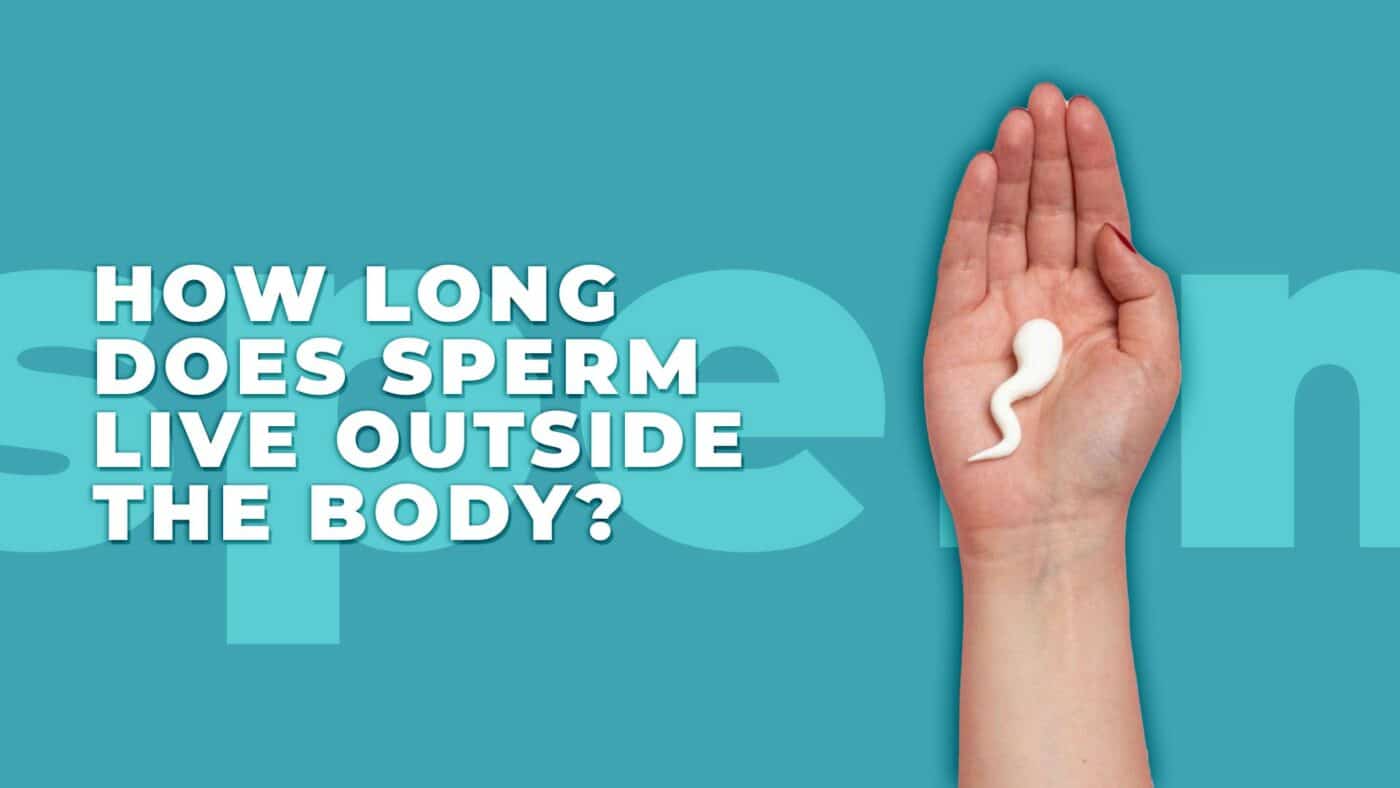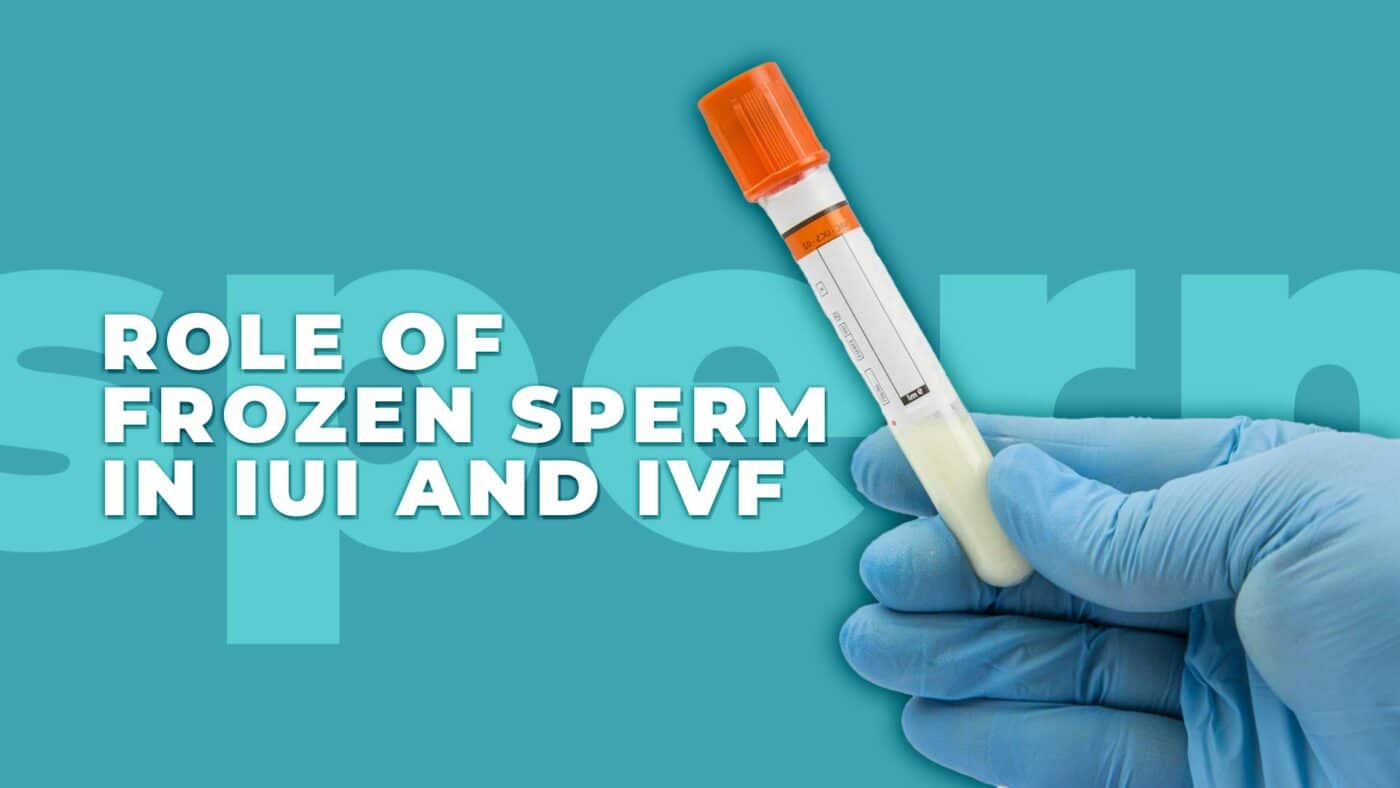How Long Can Sperm Survive Outside the Body?

Upon ejaculation, a person typically releases about 39 million sperm cells from their body, of which only a few will fertilize an egg, and the rest will perish. The lifespan of sperm cells outside the body varies depending on the surrounding environment. Whether placed in a hot tub or a cryogenic chamber, the duration for which sperm can survive outside the body is outlined below.
Table of Contents
Overview
The male testes are responsible for producing the male reproductive cells called sperm. These are created within the seminiferous tubules of each testicle. A fully formed sperm cell is comprised of a head, body, and tail and measures approximately 0.05 millimeters in length.
During fertilization, the sperm’s head, known as the acrosome, plays a crucial role in penetrating the female partner’s egg. The energy required for the tail’s movement comes from the mitochondria located in the middle of the sperm. The sperm must travel through the female reproductive system, passing through the cervix before reaching the uterus and, eventually, the fallopian tube for fertilizing the egg.
How long sperm lives inside the female body?
The survival of sperm inside a female body is influenced by several factors. While studies suggest that sperm can survive for up to five days within a female’s body, several factors, such as male infertility issues, the health of the female partner’s uterus, fallopian tubes, and vagina, can affect its survival time. The female vagina’s fertile cervical fluid helps to promote the survival of healthy sperm, which can live for up to 12 hours within the vagina’s acidic environment.
Although approximately 100 million sperm cells are produced during ejaculation, only a small number of the healthiest sperm can successfully pass through the cervix and reach the uterus. If the sperm survives this journey without harm, it waits in the fallopian tubes for up to five days, awaiting the opportunity to fertilize the female partner’s egg.
How long does sperm live outside the body?

The duration for which sperm can survive outside the body depends on its location. Under favorable conditions, sperm can live for 15 to 30 minutes outside the body. However, it will die as soon as it dries up on dry surfaces like tables or clothing. Sperm thrives in warm and moist conditions, and thus, it can survive for a longer duration on surfaces like human skin or in hot tubs.
If a healthcare provider retrieves and stores your sperm using intracytoplasmic sperm injection, freezing it under suitable conditions can increase its lifespan. In a study, around 119,558 semen samples were stored in cryogenic storage for periods ranging from six months to 15 years. The survival rate of frozen sperm samples decreased from 85% to 74%. However, if your sperm is stored for 11 to 15 years in cryogenic storage, the survival rate remains between 74 to 80%, which is about 82% of the sperm samples stored in freezing conditions for approximately six months to five years. Hence, if doctors store your sperm in cryogenic storage for an extended duration, it will have a minimal effect on the survival rate of the sperm.
The above context highlights that the survival rate of sperm is dependent on the conditions and environment, both inside and outside a woman’s body. When sperm is outside the body on any surface, it dies as soon as it dries up. On warm surfaces like human skin or in a hot tub, it can survive for up to 15 to 30 minutes. However, the survival rate of sperm decreases to three seconds in a warm environment, whereas in freezing conditions like cryogenic storage, the lifespan of sperm increases. Inside a woman’s body, sperm can survive for up to five days until the fertilization of the egg.
How long sperm lives in a hot tub?
The possibility of pregnancy occurring from sperm ejaculated in a hot tub or bathtub is very slim. In the scenario of a hot tub, the high temperature of the water or chemicals present in it can rapidly kill the sperm.
In a bathtub containing warm water without any additives, the sperm might survive for a few minutes. However, for the sperm to reach the vagina, it would need to navigate through the water and then quickly make its way through the cervix into the uterus. The likelihood of pregnancy in such circumstances is extremely low, if not impossible.
How long sperm lives while frozen?
Under appropriate conditions, sperm collected by a physician and frozen can remain alive indefinitely. According to a study published in Fertility and Sterility in 2019, 119,558 semen samples from young men were examined, which were kept in cryostorage for six months to 15 years. The survival rate of previously frozen sperm decreased from 85% to 74% over that time span. Sperm stored for 11 to 15 years had a live birth rate of 74% to 80%, compared to about 82% in sperm stored for six months to five years. Therefore, long-term freezing had minimal impact on the viability of sperm.
There are several reasons why a person may want to freeze their sperm, including before undergoing chemotherapy, before undergoing a vasectomy, if they are unable to inseminate their partner, if exposed to radiation that may cause infertility, or if they have azoospermia, a condition affecting about 1% of people where there is no sperm in the semen due to blockage of the reproductive tract or hormonal changes. It can make pregnancy through intercourse very difficult.
Can you get pregnant if there’s semen near the vagina?
It is possible to get pregnant if semen is in close proximity to the vagina, provided it has not yet dried. Contrary to popular belief, sperm can remain active until it dries up. For instance, even if you engage in unprotected anal sex, fresh sperm can potentially leak and stay near the vaginal opening. If it remains moist, it could travel upwards through the vagina and cervix to fertilize the egg in the uterus.
However, although this scenario is feasible, it is not very probable to occur.
What is the duration of pregnancy risk when a man ejaculates inside a woman’s vagina?

During vaginal intercourse, sperm is released into the acidic vagina, where those that don’t reach the cervix within a few hours are killed by the acidic environment. However, during ovulation, the pH level of the reproductive tract becomes less acidic, and the sperm can live a bit longer, giving them more time to swim toward the cervix.
Sperm that reaches the cervix and uterus can live there for up to five days, but most die within one or two days, as the cervical fluids help move the sperm through the uterus and into the fallopian tube. Some experts believe the cervical fluid acts as a filter, allowing only the most motile sperm through while blocking less motile sperm.
A few thousand sperm may complete the journey to the fallopian tube, but only a few will actually find an egg, as the rest die during the search. The average lifespan of sperm in the fallopian tube is three to four days, but some can live for up to a week. Thus, if an egg is released into the fallopian tube during this period, it could potentially be fertilized, leading to a pregnancy.
However, if a sperm reaches the fallopian tube, it must fertilize the egg within 12-24 hours of its release from the ovary in order for pregnancy to occur.
What is the lifespan of sperm in a condom?
Sperm ejaculated into a condom can remain viable for a few hours, while sperm that comes into contact with fabric or skin typically only survives for a few minutes.
In terms of storage, under proper conditions, sperm can be preserved in a laboratory for up to a week. Sperm frozen in a laboratory for storage can also be thawed and revived for successful use in IVF even years later.
What is the significance of sperm motility in pregnancy?
After ejaculation during sexual intercourse, the sperm travels from the vagina through the cervix and uterus, aided by contractions of the uterus. The sperm can reach the fallopian tubes within minutes, particularly if the woman is near ovulation. In order for pregnancy to occur, the cervical mucus must be favorable, preferably with egg-white consistency. If the cervical mucus is thick or dry, the journey for the sperm becomes more difficult.
While sperm count is often a concern for couples trying to conceive, sperm motility is equally important in male fertility. Sperm motility refers to the ability of the sperm to swim correctly, and it may play a significant role in achieving pregnancy. If the sperm is unable to reach the egg, pregnancy is unlikely to occur.
A number of factors can influence sperm motility, including stress levels, exposure to excessive heat, certain medications, and poor diet. If sperm motility is a factor in infertility, couples may consider several options, such as intrauterine insemination (IUI), in which the sperm is placed directly inside the woman’s uterus, or in vitro fertilization (IVF), in which the sperm and egg are fertilized in a laboratory before being placed inside the uterus. Intracytoplasmic sperm injection (ICSI) is another option, in which the sperm is injected directly into the egg as part of the IVF procedure.
How to improve sperm health?
Enhancing sperm health is possible through various means, such as taking vitamins before attempting to conceive and reducing risk factors that can compromise sperm cell health. To improve sperm quality, men can:
- Maintain a healthy weight: Excess weight can disrupt sperm production and hormones needed to support the process.
- Quit smoking: Smoking has been linked to decreased sperm count.
- Limit alcohol use: Alcohol consumption can impact testosterone levels, which can decrease sperm count.
- Refrain from drug use: Anabolic steroids, marijuana, and cocaine have been associated with decreased sperm production.
- Take vitamins: Regular vitamin intake can provide essential nutrients to improve sperm health. It is advisable to start taking vitamins at least three months before attempting to conceive. Multivitamins for men are available for purchase online.
- Keep testicles cool: Activities that raise the scrotal temperature, such as spending time in saunas or hot tubs, wearing tight clothing, or placing a laptop on the lap, can reduce sperm production.
Role of frozen sperm in IUI and IVF

Both fresh and frozen sperm can be used for intrauterine insemination (IUI) and in vitro fertilization (IVF). Using frozen sperm can be beneficial for a variety of reasons, including using donor sperm or preserving fertility for a man who has cancer.
The process of thawing frozen sperm is relatively simple, involving a wait of around 30 minutes for it to reach room temperature before warming it up to body temperature. Once thawed, the sperm cannot be refrozen.
Although there is some concern that thawing may compromise the integrity of frozen sperm, studies have shown that it can be just as effective as fresh sperm in achieving pregnancy, particularly when used with IVF and intracytoplasmic sperm injection (ICSI).
Is spermicide as effective as birth control?
Spermicides are a form of contraception that can be used with or without condoms, and they come in various forms, such as creams, gels, foams, and suppositories. Rather than killing sperm, spermicides work by preventing semen from moving, which reduces sperm motility. The woman applies spermicide near her cervix to prevent sperm from entering the uterus.
When used correctly and consistently with male condoms, spermicide is 98 percent effective, while typical use is 85 percent effective. Female condoms with spermicides are 70 to 90 percent effective. However, spermicide alone is not a reliable form of birth control without condoms, as it fails about 28 percent of the time to prevent pregnancy. Even when used correctly and consistently, spermicide alone is only 82 percent effective.
Final Thoughts
Regarding the survival of sperm outside the body, it depends on the environment they are exposed to. However, if they are not introduced into a female’s reproductive system, sperm are quite fragile and can only remain viable for a few seconds to a few minutes.
References
- Long-term cryostorage of semen in a human sperm bank does not affect clinical outcomes. Huang, Chuan et al.https://www.fertstert.org/article/S0015-0282(19)30505-9/fulltext
- Amy at Planned Parenthood. (2010). Can you get pregnant in a hot tub if you’re not having sex?
plannedparenthood.org/learn/teens/ask-experts/can-you-get-pregnant-in-a-hot-tub-if-you-e2-80-99re-not-having-sex - Cayan S, et al. (2001). A comparison of ICSI outcomes with fresh and cryopreserved epididymal spermatozoa from the same couples. DOI:
10.1093/humrep/16.3.495 - Conception: How it works. (n.d.).
ucsfhealth.org/education/conception_how_it_works - RUBBER AND SPERM-SURVIVAL Ranson, R.M. https://www.thelancet.com/journals/lancet/article/PIIS0140-6736(00)83252-3/fulltext
- Lindemann C. (n.d.). Mechanisms of sperm motility: Frequently asked questions.
files.oakland.edu/users/lindeman/web/faq.htm - A comparison of ICSI outcomes with fresh and cryopreserved epididymal spermatozoa from the same couples. https://doi.org/10.1093/humrep/16.3.495
- Sperm Recovery and IVF after Testicular Sperm Extraction (TESE): Effect of Male Diagnosis and Use of Off-Site Surgical Centers on Sperm Recovery and IVF. https://doi.org/10.1371/journal.pone.0069838
Disclaimer
HisBlue is not a substitute for professional medical care or advice from your doctor. The health information on the HisBlue website is general and provided for your information only. We have ensured our content is accurate and current, with reviews by expert doctors. However, we cannot guarantee its accuracy or timeliness. This information is not meant to replace the diagnosis, treatment, or judgement of your doctor or another qualified healthcare provider.
plannedparenthood.org/learn/teens/ask-experts/can-you-get-pregnant-in-a-hot-tub-if-you-e2-80-99re-not-having-sex
10.1093/humrep/16.3.495
ucsfhealth.org/education/conception_how_it_works
files.oakland.edu/users/lindeman/web/faq.htm
Disclaimer
HisBlue is not a substitute for professional medical care or advice from your doctor. The health information on the HisBlue website is general and provided for your information only. We have ensured our content is accurate and current, with reviews by expert doctors. However, we cannot guarantee its accuracy or timeliness. This information is not meant to replace the diagnosis, treatment, or judgement of your doctor or another qualified healthcare provider.


